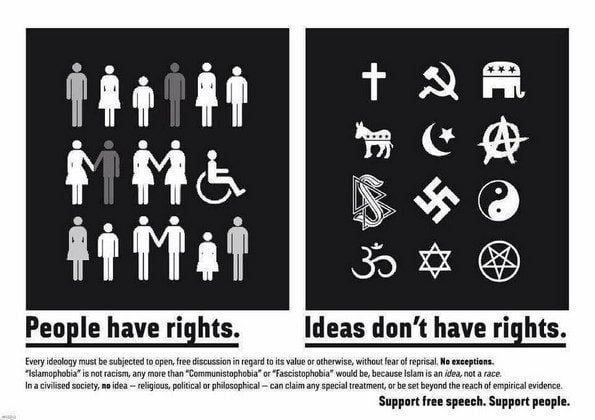
Evangelical Christians, among others, have private (personal) beliefs that people such as I consider uninteresting, intellectually lacking, or irrational. As long as they do not try to force their beliefs on me, codify their beliefs into law, or demand special treatment, I am quite indifferent toward their beliefs. I have no interest in regulating what people believe about God, Jesus, the Bible, or anything else for that matter.
However, when Evangelicals state/argue/debate their beliefs in the public space — newspapers, TV, books, magazines, Facebook, Twitter, the Internet, public meetings, etc. — then the rules of engagement change. Once these beliefs are uttered publicly they are no longer considered private and are open to criticism, investigation, debate, ridicule, mockery, and attack. People deciding to utter their beliefs in public should know this, and if they don’t, they are in for a rude awakening the first time they “share” their beliefs publicly.
As a writer, hopeful author, essayist of letters to the local newspaper, and the public face of atheism where I live, I am considered a public figure. As such, I open myself up to criticism, investigation, debate, ridicule, mockery, and attack. While I would hope people would treat me fairly and with respect, I have no right to expect such treatment and I have no recourse if someone lies about me, distorts my beliefs, or attacks me personally.
I can’t do anything about what someone may say about me or my writing on their own blog or in an internet forum. I can’t control the sermons Evangelical preachers preach about me. They can take something I have written and twist and distort it, and there is nothing I can do about it. This is the wild, woolly nature of the public space.
I wish Evangelical Christians would understand the difference between private and public. When they drag their beliefs into the public space, they have no right to whine, moan, or complain that I am attacking them and their beliefs. If they don’t want their beliefs assaulted or challenged, then they need to keep them out of the public space. As Tristan Vick said in a comment:
Someone needs to tell this caterwauling Christian that it’s people who have rights, not ideas.
Evangelicals often think that this blog is public; that they have a right to say whatever they want in the comment section. However, this blog is actually private; a site that the public can read and if they follow the rules comment on. As the owner of a private site, I have the absolute right to decide who may comment and what comments are approved. This site is no different from the churches Evangelicals attend.
If Evangelicals want to take me to task, critique my writing, or attack my character, they are free to do so on their own blogs, from the pulpits of their churches, on their podcasts, or any other medium of their choosing. But not on my blog.
Bruce Gerencser, 68, lives in rural Northwest Ohio with his wife of 47 years. He and his wife have six grown children and sixteen grandchildren. Bruce pastored Evangelical churches for twenty-five years in Ohio, Texas, and Michigan. Bruce left the ministry in 2005, and in 2008 he left Christianity. Bruce is now a humanist and an atheist.
Your comments are welcome and appreciated. All first-time comments are moderated. Please read the commenting rules before commenting.
You can email Bruce via the Contact Form.

Hell Bruce, they could even just trash you on Facebook. But no, they have to come here to annoy everyone, and proclaim their magnificent Christianity composed of people who hate most other people. I have some Christians as friends, and they try to live their lives for the good of others. But it doesn’t even seem to occur to the trolls that try to camp here.
That’s certainly reasonable. If I get around to inviting comments on my blog, I would probably post a disagreement, but if the language isn’t suitable for my grandchildren, I’d toss it, and there’s no reason to post verbal abuse. If it’s too strong, I’d be tempted to print it out just so I could burn it.
I believe it’s our duty to examine and critique ideas, but to do so in a way that is respectful to the person involved. However, if they’re going to attack me personally in the process, I might not respond to the attack so respectfully.
This reminds me of an interesting claim, namely that ‘God has rights’. This didn’t come from a Christian, but nonetheless, it’s kinda interesting. Does an omnipotent, omnipresent being need rights, as applied to human beings? Why make the argument at all? This being, if they exist, can snap their fingers, and reconfigure the universe with a thought. Surely we’re better served focusing on human rights?